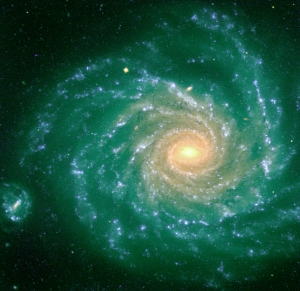@BrightNoon,
KaseiJin;87207 wrote:Consciousness, as the sum of all subjective experience by vertebrates, and especially primates, is in relationship with the real world, as part of the real world, within the enclosure and domain of a translating process on behalf of the body which it is working on by the brain.
In amplifying this (and please note that I did edit to correct language mistakes--spelling) it is firstly to demonstrate that I am only referring to a narrow band of experience, namely that of vertebrates, and especially of the primates--
since in one manner of understanding, we could feasibly think of, for example, a sandstone rock sheet as having had the experience of being pressed into a rock sheet. Next, I am further limiting
subjection to that of the organ which is the major carrier of presentable
subjectiveness--the brain--as the interpreter of sensory input. Finally, I am also pointing out that
that organ, and the body it works on, is a member of the real world--(
but here I am using the term 'real world' to express that it is, afterall, real).
Therefore, in answer to your:
[indent]
BrightNoon;87136 wrote:
1. What is the relationship between consciousness and the 'real world,' i.e. the world which (we assume) exists external and independent of our experience of it.
[/indent]
I was pointing out that the relationship is one of interpretation--very much like the interpretation from one language to another.
BrightNoon;87217 wrote:If we define the external world as that which exists outside and independent of experience, then indeed to suggest that the external world exists is an assumption as, by definition, we cannot know whether or not it exists.
As a mental exercise, taking such a definition can be fun, of course, yet to deny that I am a member of the real world is as nonsensical as denying that removal of my hippocampi will destroy my ablility to sum my experience. The link is the translation, and that what might have been left out in your proposition. The end of sensory input from the outside, real world, is the brain, and after some processing some of that out, or reducing it, awareness of it in the reportable state of consciousness.
I would suggest that the philosophical view you may have adapted is where the weak link is, and is where the disconnect may well lie. In that a sensory experience usually is spurred by actual external stimuli, we can know that the world is--no need to doubt that at all. What would be the real point of trying to question whether a real snake just bit you on the leg? a real traffic light just turned red? or the real sounds of following footsteps behind you on an empty street late at night?
Sensory signals are translated in process by brain, and what goes into the realm of
access consciousness is what amounts to
the sum of subjective experience that we can know of, be aware of, and report on. It has been shown that memory traces can, and do alter ever so slightly (especially much more so in some cases), but that is not to describe that present world reality, but to replay the trace. (I'm talking about memory here) If there are faults or errors in that, it is an internal (relative to the brain) reality, and that might not make an accurate model of that external (realtive to the brain) reality. However, this really presents no big problem, we humans (and surely other animals as well) have been dealing with mismemory correction by the consensus of others (and personal review) for years.
While the human brain build is quite regular (and there is hardwiring too), it is also not that far off from the Great Ape brain build, and in lesser degrees of similarity on down to other species. This will mean that most interpretation of sensory input will be quite similar.
Interpretation is the point. If we humans do not have the sensory equipment to experience electric field charges in some particular way, so what? If cats do not have the equipment to experience sweetness as we do, what of it? It is not practical to consider electrical field charges or sweetness as properties of external reality simply because our translation equipment is different to some degree--
the stuff is still there.
Therefore, while it might be good to be careful with the term '
objective,' and not so pressing a need (in some cases) to be concerned with interpretation or memory accuracy, it would most certainly be impractical to assert that it would be dubious to understand that the world, including ourselves, is real.
Other points towards backing up my presentation here, however, will most likely take place on the original consciousness-related thread, much more often than not...since focus is important, and I don't have time to spread myself out too much. Apologies for that.
You have put forth some things that I hope to (basically intend to, but . . .) get to on the other thread, salima
baheen.
---------- Post added 09-01-2009 at 11:51 AM ----------
Pathfinder;87231 wrote:Does the brain of a chimp and the brain of a human, both sitting in a field together looking at a tree, operate in the same way with regard to how it biologically/mechanically interprets what they think they are looking at?
The average of the best evidence collected so far, says that the two organs work very much alike, with some subtile differences here and there (such as a slightly different number of neurons for color assimulation, for example...and so on).

